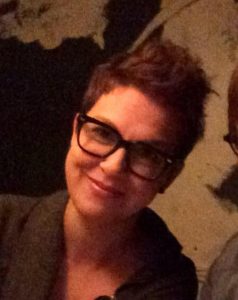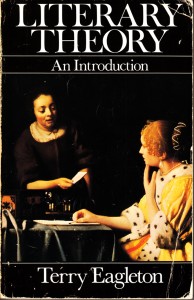“On the Spot” backs members of Culture on the Edge into a corner to talk about their backgrounds, their ongoing work, and what might be gained by an alternative understanding of how identity works.
 1. When people ask what you study, what do you tell them?
1. When people ask what you study, what do you tell them?
Well, if they’re asking what I study, they’re probably academics. Because how it typically goes is:
“What do you do?”
“I teach at the University of Alabama.”
“What do you teach?”
If the question doesn’t emphasize what most folx see as the more immediate/visible work of the profession, it’s usually coming from someone inside that same profession. Teaching and research are interconnected, of course (or should be, anyway), but “study” is kinda insider-speak… ain’t it the way? So among my community of insiders, I tell them I study and write about authenticity rhetoric — specifically how/why it appears in theories of gender and race. Even more specifically, my work tends to have a geospatial focus on the Caribbean and the American South as circum-Atlantic regions.
My Ph.D. is in English, so I bring a literary theory background to religious studies and try to put some proverbial money where my interdisciplinary mouth is. What does that mean in practical terms? Well, I write and teach about a lot of different things, but they tend to involve my interest in when and why ideas about authenticity or realness seem to appeal and have traction and when they don’t. Along the way, I apply identity theory outside the field to my own academic study of religion. Continue reading “On the Spot with Merinda Simmons”


 With my earlier career in mind, it would have to be Terry Eagleton’s Literary Theory: An Introduction (1983), though I have the 1989 edition, which I bought in Toronto in January of 1991 (evident, again, from my dated front inscription). It too was a book recommended to me by Neil McMullin, and it makes sense to be dated a little later than my copy of The Sacred and the Profane, for (at least as I remember it now), I wasn’t dipping into theory until I’d confirmed that there was a project of some sort to be done on the widespread essentialist understanding of religion as socio-politically and historically autonomous. So having decided there was indeed a project here, at least as applied to Eliade’s one book, the challenge was to start reading as much of his work as I could, and to then be able to make the case that his work exemplified (though it didn’t necessary cause) much wider trends evident throughout the field, and then to come up with a set of tools to critique this approach and identify its practical implications. And that’s where Eagleton’s work came in—helping me to make the shift from seeing words and texts as inherently meaningful, as being in reference to objects in the world that we were talking about, to identifying the apparatuses necessary to signify these scribbles that we call letters, to read them as meaningful—to, as I might now say, operationalize them. Given that I was a sciences undergrad, I’d only taken the virtually mandatory first year English Lit course, with my thick two volume Norton anthology, so reading literary theory, much less the social theory I later came to read, was completely alien to me.
With my earlier career in mind, it would have to be Terry Eagleton’s Literary Theory: An Introduction (1983), though I have the 1989 edition, which I bought in Toronto in January of 1991 (evident, again, from my dated front inscription). It too was a book recommended to me by Neil McMullin, and it makes sense to be dated a little later than my copy of The Sacred and the Profane, for (at least as I remember it now), I wasn’t dipping into theory until I’d confirmed that there was a project of some sort to be done on the widespread essentialist understanding of religion as socio-politically and historically autonomous. So having decided there was indeed a project here, at least as applied to Eliade’s one book, the challenge was to start reading as much of his work as I could, and to then be able to make the case that his work exemplified (though it didn’t necessary cause) much wider trends evident throughout the field, and then to come up with a set of tools to critique this approach and identify its practical implications. And that’s where Eagleton’s work came in—helping me to make the shift from seeing words and texts as inherently meaningful, as being in reference to objects in the world that we were talking about, to identifying the apparatuses necessary to signify these scribbles that we call letters, to read them as meaningful—to, as I might now say, operationalize them. Given that I was a sciences undergrad, I’d only taken the virtually mandatory first year English Lit course, with my thick two volume Norton anthology, so reading literary theory, much less the social theory I later came to read, was completely alien to me.